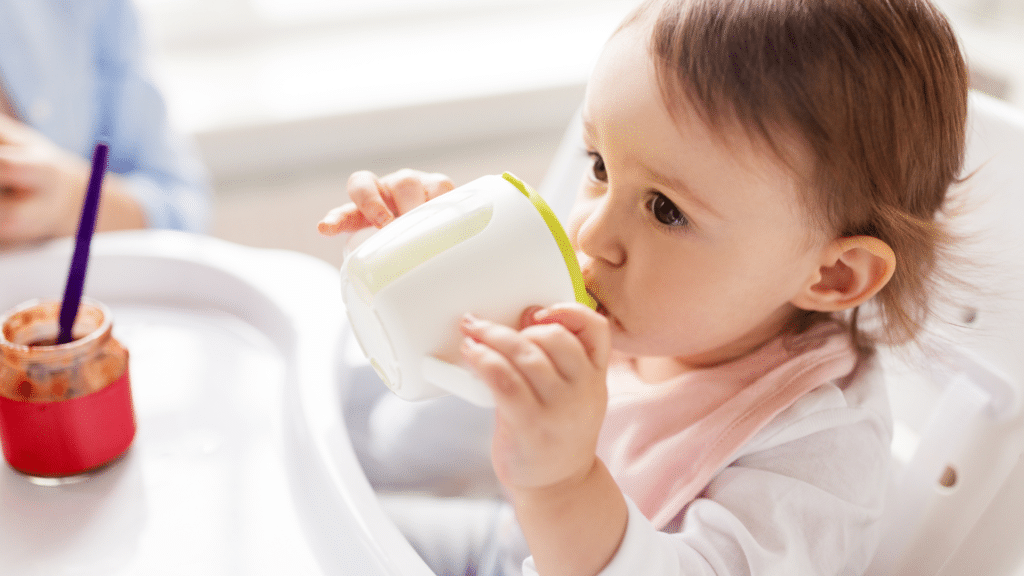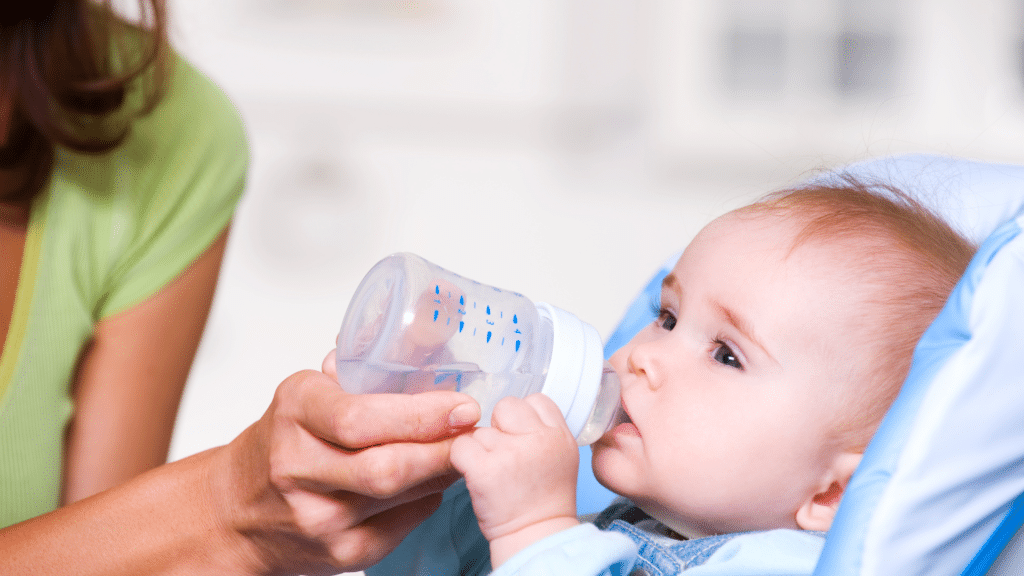Hydration is a critical aspect of a baby’s health, particularly during the early stages of life when they’re experiencing rapid growth and development. In this blog, we’ll explore the discussion around feeding babies’ juice instead of water. Unpacking this topic will involve looking at how newborns obtain hydration, the role of water and juice, when it’s appropriate to introduce each, and the importance of balancing hydration and nutritional needs throughout infancy.

The Importance of Hydration for Babies
Hydration plays a significantly pivotal role in the early stages of a baby’s life. The newborn phase is characterized by rapid growth and development, during which proper hydration becomes crucial.
Newborn Hydration: Breast Milk and Formula
Newborns receive their necessary hydration primarily through breast milk or formula. Both options offer a balanced mixture of water and nutrients crucial for growth and development.
Breast milk is comprised of about 90% water, serving as the perfect hydration source for an infant, especially within their first six months. Plus, it contains antibodies that can help the baby fend off infections and diseases.
Likewise, infant formula is designed to mimic the nutritional composition of breast milk, providing enough water content when prepared as guided.
Newborns: Immature Kidneys & Digestive Systems
Due to their immature kidneys and digestive systems, newborns are highly susceptible to changes in diet.
Kidneys, specifically, play an essential role in maintaining water balance in the human body. Newborns’ underdeveloped kidneys cannot effectively concentrate urine, meaning they’re susceptible to losing more water, making hydration even more significant.
Similarly, a newborn’s developing digestive system is equally sensitive to changes in diet. There’s a risk of digestive difficulties, nutrient malabsorption, or fluid imbalance if there’s an abrupt alteration or if feeds are not prepared properly.
Water vs. Juice: What’s the Difference?
While both water and juice can aid in hydration, they differ significantly in nutritional content, health benefits, and potential drawbacks.
Water: A Simple and Pure Hydration Source
Water is the epitome of simplicity and purity when it comes to hydration. It contains no calories, additives, or sugars, making it the safest and most neutral drink for maintaining body hydration.
For infants and children, water aids in digestion, nutrient absorption, and regulation of body temperature. It’s important to remember, however, that exclusively breastfed babies don’t need additional water until they begin eating solid foods. For formula-fed infants, water is used to prepare the mixture.
Juice: Sugar Content and Nutritional Value
Juice drinks, including fruit juices, differ from water in terms of sugar content and nutritional value depending on the type and how it’s prepared.
Some benefits of drinking juice include the vitamins and minerals obtained from the fruits or vegetables used. For example, orange juice is rich in Vitamin C, while apple juice offers a good dose of potassium.
However, it’s significant to note that many types of juice drinks, especially commercially prepared ones, often contain added sugars, which can lead to various health issues like dental cavities and weight gain.
Juices like apple, pear juice, grape, and cherry juice often have high sugar content. Even “100% fruit juice” has naturally occurring sugars from the fruit, and it lacks the fiber found in a whole fruit, which helps slow down sugar absorption.

When deciding to offer juice, ensure you’re offering juice with no added sugars and try to dilute juice with water to reduce sugar content. The American Academy of Pediatrics recommends avoiding baby juice for babies under 12 months and limiting juice drinks intake for older children due to high sugar content and low nutritional value compared to whole fruits.
While water remains the safest option for staying hydrated, drink juice or drinking fruit juice should be given in moderation, considering its high sugar content and potentially less nutritional value than whole fruits. Always prioritize whole fruits over serving juice for babies and children when possible.
When Can Babies Start Drinking Water?
Starting babies on the water isn’t as immediate as one might think. There are crucial factors involved, including the baby’s age and their primary source of nutrition.
Recommended Age for Introducing Water
The general consensus among experts, including the World Health Organization and the American Academy of Pediatrics, is that babies should start drinking small amounts of water after they are six months old when they begin eating solid foods.
Prior to this age, babies receive all the necessary hydration from breast milk or formula, which are densely packed with vital nutrients and elements required for their growth and development.
Why the Delay in Introducing Water?
Introducing water too early can have several potential side effects:
- Interference with Nutrition: Babies have small stomachs, and drinking water might fill them up, reducing their desire for nutrient-rich breast milk or formula.
- Potential for Water Intoxication: Due to their immature kidneys, babies can’t process large amounts of water. This can disturb their electrolyte balance, leading to serious complications like seizures.
- Undernutrition: Water doesn’t provide calories or nutrients. If consumed in large amounts, it may replace breastmilk or formula, leading to inadequate nutrition intake.
Risks and Concerns of Introducing Juice
While juice is seen as a refreshing drink option, substituting water with juice in a baby’s diet is not recommended. The following are some of the risks and concerns associated with early and excessive juice introduction.
High Sugar Content and Health Impact
Juices, even those labeled as 100% fruit juice, contain high levels of sugar. These sugars, whether natural or added, can lead to a number of health issues:
- Weight Gain and Obesity: Frequent consumption of high-sugar beverages can contribute to unnecessary caloric intake, potentially leading to weight gain and an increased risk of obesity.
- Poor Nutrition: Juice lacks many of the essential nutrients found in whole fruits and vegetables. Consuming juice in place of whole foods can lead to nutrient deficiencies.
- Insulin Resistance and Diabetes: High sugar consumption is linked to increased insulin resistance, a precursor to type 2 diabetes.
Gastrointestinal Issues and Allergies
Juices, especially those with high acidity, can cause or worsen gastrointestinal issues, such as diarrhea or gastroesophageal reflux disease (GERD).
Furthermore, some babies may be allergic to certain fruits, and consuming juice from these fruits could trigger allergic reactions.
Tooth Decay
The sugars in juice can contribute to tooth decay. Prolonged exposure of the baby’s teeth to these sugars, such as through the use of a bottle or sippy cup, can lead to “baby bottle tooth decay.”
To minimize these risks, juice consumption should be limited in babies and toddlers. The American Academy of Pediatrics suggests waiting until a child reaches one year of age before introducing juice, and even then, they recommend no more than 4 ounces a day.
As always, it’s important to speak with a healthcare provider or registered dietitian before introducing any new foods or beverages into a baby’s diet.

Nutritional Needs of Infants
During the first year of life, babies have specific nutritional needs to support their rapid growth and development. Let’s delve into these needs and the primary sources that can meet them.
Breast Milk or Formula: Meeting Nutritional Needs
During the first six months of life, a baby’s nutrition is sufficiently met by breast milk or formula. These provide a perfectly balanced diet for an infant, offering:
- Proteins for growth and development
- Fats for brain development and energy
- Carbohydrates for energy and growth
- Vitamins and minerals for various bodily functions and immune health
Breast milk, specifically, adapts to an infant’s growing needs. For example, the milk produced during the first days after birth, known as colostrum, is rich in protein and antibodies. As the baby grows, the composition of breast milk adjusts to meet its changing nutritional needs.
Formula, on the other hand, is designed to mimic breast milk as closely as possible, focusing on providing the main nutrients in appropriate quantities.
This is why additional liquids like juice are usually not necessary, as they can displace the intake of these more nutritionally dense feeds.
The Role of Different Liquids in the Diet of an Infant
While this blog has adequately covered the significance of hydration in an infant’s diet, it focused primarily on the use of water and juice. An often-overlooked but absolutely essential aspect of an infant’s diet is the role of other liquids such as soups, dairy milk, almond milk, herbal teas, and broths, among others, when you introduce solid foods. These other liquid sources can be very beneficial to augment the nutritional content in your infant’s diet and to ensure that they are getting a balanced intake.
When we talk about ‘other liquids,’ we should always be clear that babies should receive their primary nutrition from breast milk or infant formula for at least the first year of life. It means that while these other liquids can be introduced and provide benefits, they should not displace milk feeds during the first year of life when nutritional demands are high and underlying growth and development are rapid.
In a later stage of infancy, around the age of six months to a year, different liquids can be gradually introduced. For instance, soup and broth made from wholesome and fresh ingredients can provide an excellent source of vitamins and minerals. These are easy for the baby to digest and a feasible means to introduce them to different flavors. Be careful to avoid adding unnecessary salts and sugars. Make sure the soups and broths are strained well to prevent the risk of choking.
When choosing soups, broths, and other liquids, stick to fresh, homemade options. Canned or ready-made varieties often contain preservatives, added sugars, and high sodium levels, which can be unhealthy for your child. Concerning broths, bone broth should only be introduced when recommended by the pediatrician due to the high levels of protein, which may be too difficult for an infant’s developing kidneys to process.
Milk alternatives like soy, almond or rice milk can also be introduced into a baby’s diet after the age of one year, but they should not be used as a primary drink until the child is at least two. These drinks shouldn’t replace the breast milk, formula, or whole cow’s milk which is essential for an infant’s development. Remember, these milk alternatives are not nutritionally equivalent to cow’s milk, which is rich in calcium, protein, and other essential nutrients. They can, however, contribute to the hydration mix.
Herbal teas can also be introduced in small amounts after the child is one year old, but parents need to ensure that they are caffeine-free and have no added sugars. Some herbal teas can also have a calming effect on the baby, particularly ones containing chamomile or fennel. Cooled herbal teas are excellent during hot weather.
Lastly, avoid giving your infant drinks like sodas, energy drinks, and any caffeinated or artificially sweetened beverages as these can harm their delicate systems and teeth.
Introducing various liquids to infants can become a bridge between liquid and solid foods and can aid in the transition process by gradually introducing them to new, more complex flavors. Each liquid brings unique nutritional benefits and risks, and so it is important to carefully choose what to introduce and when. Always consult with a healthcare provider or registered dietitian before introducing any new foods or beverages into your child’s diet, as some children may have food intolerances or allergies. An experienced health professional can provide an individualized feeding plan that meets your child’s specific needs and ensures a healthful, balanced diet.

Conclusion
In conclusion, it is vital to prioritize breast milk or formula as the primary sources of hydration and nutrition for infants, as they provide the perfect balance of nutrients and water content necessary for their growth and development. As your baby grows and begins to consume solid foods around the 6-month mark, it’s crucial to ensure a balanced diet that meets their changing needs.
Introducing water is essential at the right time and in the right amounts. However, substituting water with juice is not recommended due to its high sugar content and potential health concerns. When juice is introduced, focus on moderation and choose 100% fruit juice options without added sugars. Keep in mind, it’s better not to serve juice too frequently and be aware that too much juice can pose problems.
Another aspect to consider is the safety of the juice. Raw fruit juices should be avoided completely as they can contain harmful bacteria that can lead to illnesses.
Keeping yourself informed and taking a balanced approach to hydration and nutrition is essential for your baby’s growth and development. Always consult with a healthcare professional before making any changes or new additions to your baby’s diet. By doing so, you’re setting your child up for a lifetime of healthy and well-informed choices.
This article may have helped you. Please comment below and let us know. If you have any questions, don’t hesitate to ask!



